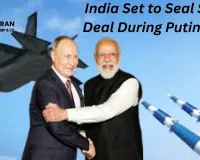Madagascar's Shocking Coup: From Cartoon Island to Global Flashpoint
Digital Desk
1.jpg)
Imagine an island paradise straight out of a kids' movie—lemurs swinging through jungles, beaches glowing under the sun. Now picture that same place exploding in chaos: streets choked with furious crowds, soldiers turning on their bosses, and a president vanishing into thin air.
That's Madagascar right now, folks. In just weeks, what started as gripes over blackouts and empty taps has snowballed into a full-blown military takeover. And it's not happening in isolation—it's part of a wild wave of youth rebellions sweeping the globe, from Nepal's streets to Mexico's flood-ravaged towns.
As of October 14, 2025, President Andry Rajoelina is on the run. The once-charismatic DJ-turned-leader, who grabbed power in a 2009 coup and won elections in 2018, fled the capital Antananarivo amid massive protests. Why? Picture this: 75% of Madagascar's 30 million people scraping by on less than $2 a day, kids studying by candlelight because power flickers out for days, and water taps running dry in a country that's 90% rainforest. Youth, making up 60% of the population, lit the fuse. Armed with TikTok and Facebook, they channeled the same fiery energy that toppled Nepal's government last month—demanding jobs, justice, and an end to the elite's stranglehold on vanilla and nickel riches.
The tipping point? The military's elite CAPSAT unit—ironically the same crew that boosted Rajoelina to power 16 years ago—said "enough." On October 12, these troops refused orders to bash protesters, accusing top brass of corruption. By Tuesday, they'd seized control, suspending parliament and impeaching the president in absentia. Clashes turned deadly, with dozens killed, but the soldiers' defection handed the streets to the crowds. It's a classic Madagascar merry-go-round: independence from France in 1960 kicked off cycles of coups, charisma, and collapse. Rajoelina's fall echoes that—rising as the anti-corruption hero, only to drown in scandals.
But zoom out, and this isn't just island drama. Madagascar's spot in the Indian Ocean, guarding Africa's southern flank, makes it a geopolitical chessboard. France, the old colonial boss, faces whispers of meddling—did they whisk Rajoelina away on a jet? China eyes its nickel mines for EV batteries; the US frets over sea lanes. A power vacuum here could ripple to neighbors like Mozambique, already reeling from jihadist threats.
This frenzy ties into a bigger storm. Just days ago, world leaders inked a fragile Gaza ceasefire at Egypt's Sharm El-Sheikh summit—awkward handshakes amid hopes for lasting peace. Meanwhile, Venezuela's opposition firebrand María Corina Machado snagged the 2025 Nobel Peace Prize for battling dictatorship, a nod to global fights against strongmen like Rajoelina. And across the Atlantic? Mexico's October deluge has claimed over 60 lives, burying villages in mudslides and cutting off 300 communities—another brutal reminder that climate chaos amplifies unrest everywhere.
So, what's next for Madagascar? A youth-led dawn or more turmoil? With Gen Z at the helm, inspired by Nepal's playbook, hope flickers. But history screams caution: without fixing poverty and building real institutions, this could be just another loop. The world watches—will we help stitch it back, or let the lemurs fend for themselves? Stay tuned; this cartoon island just got real.











